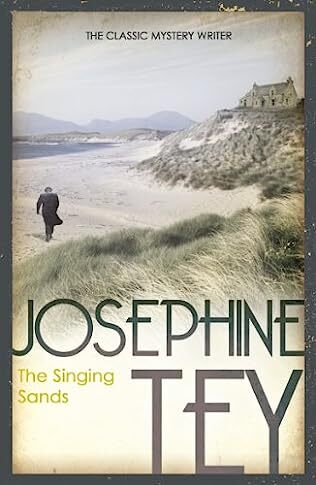The Singing Sands

A review of The Singing Sands by Josephine Tey – 230627
Originally published in 1952, the year of her death, The Singing Sands is the sixth and final novel in Tey’s Inspector Alan Grant series. Grant is a much more complex, more human, more vulnerable character than the normal sleuth in the hands of other crime fiction writers. Indeed, in his final two cases, he is either in his sick bed looking for intellectual stimulation through the investigation of the mystery of the princes in the Tower in The Daughter of Time or, as is the case here, recuperating from what seems to be close to a nervous breakdown brought on by overwork and characterised by extreme bouts of claustrophobia.
The Singing Sands is a book about mania, obsession, and battles with demons. Grant is travelling up to the Highlands of Scotland to stay with his cousin, Laura, and her husband, Tommy, one of Grant’s old school friends, and to spend some weeks engaging in an activity which he regards as being somewhere between a sport and an obsession, fishing. He hopes that the open spaces, the fresh air and the exercise will help him recover his equilibrium and help overcome his almost debilitating fear of confinement in close spaces.
However, as is often the way with detectives on leave, his trip to Scotland turns out to be something of a busman’s holiday. As he leaves the sleeper, he sees the ticket inspector trying to rouse a passenger in a compartment reeking of whisky, a vain task as the man is clearly dead. Grant, unlike the usual ‘tec, walks away but in the restaurant finds that he has picked up the dead man’s newspaper in which is inscribed a set of enigmatic lines including the one from which the book draws its title. Grant is intrigued and wonders what the lines mean and what the young dead man was up to. Was he too a troubled soul, battling his demons, finding his route to salvation not in the form of a fisherman’s fly but in a bottle?
Rather like a fish he was hoping to catch, Grant swallows the bait hook, line, and sinker and spends much of his time trying to identify the man, discover the reason for his death – he doubted it was a simple case of suicide – and, if necessary, bring the dead man justice. Some of us read books or do crossword puzzles for intellectual stimulus in our leisure time but detectives just solve cases.
Inevitably, there is a complex story behind the young man’s demise and while there is a Singing Sands in the Western Isles which Grant identifies and visits, the sands which are mentioned in the verses are to be found in Arabia and hide a lost city, a veritable Shangri-La, revealed as the young man, a commercial pilot, flies through a dust storm. It turns out to be a tale of obsession and greed, more forms of mania, in which overarching ambition leads men to commit crimes to frustrate the plans of others. The book’s resolution relies upon a death bed style confession in the form of a letter which I always find a tad unsatisfactory.
However, although there is enough in the plot to keep the reader on their toes, Tey’s books are more than a piece of routine crime fiction. She is more of a novelist, as much if not more interested in the psychology of her characters and their reactions to the situations in which they find themselves as resolving a complex chain of events. Her writing style is beautiful, her love for the country and her appreciation of the wonders of nature profound. It is a delight to read.
The story also shows a delicious mix of the modern and the old. Grant travels sometimes by aeroplane, a challenge for someone with severe claustrophobia which he manages to overcome, and yet relies on the time-tested method of inserting advertisements in the national papers to give him a lead. One advert in a roundabout way brings a young American pilot into the story and it is his inside knowledge of the victim that helps Grant move nearer to finding out what happened to him. There Is also much about the Scottish independence movement, and wry observations about those who have loose associations with the country adopting all its supposed customs and costumes with gusto.
Grant returns to work, his Scottish jaunt having proven to be the tonic he needed, even though he had considered resigning and turning to pastures new. The irony, of course, that this book, published posthumously, marked the end of his career due to Tey’s untimely death at the age of fifty-six.



